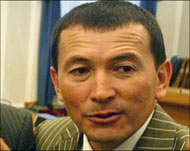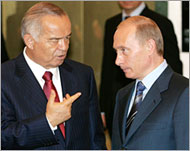Troops quell Kyrgyz prison revolt
Kyrgyz government troops have stormed and seized back control of a prison held by inmates for nearly two weeks in an operation that left two inmates dead.

Prisoners had taken control of Prison No 31, 25Km northwest of the capital Bishkek, during rioting that swept prisons across the Central Asian country on 20 October. A parliamentarian and two other people were killed then.
On Tuesday, special forces troops, supported by dozens of interior ministry soldiers and armoured personnel carriers put down the mutiny.
Grenades, submachine guns, rifles and pistols were seized, a prisons service official told Reuters.
“The situation is under our control at the moment,” said the official, who declined to be named. “Two of the inmates were killed and one was wounded.” The prisons service chief, Kapar Mukeyev, was slightly wounded, the official said.
On Tuesday morning, armoured personnel carriers and interior ministry soldiers blocked approaches to Prison No 31.
The prisons service official said that the inmates had barricaded the prison gate with a fire engine and an armoured personnel carrier.
Vladimir Pirogov a Reuters photographer working at the scene heard intense shooting coming from the prison as troops battled inmates.
20 killed
 |
|
Tymytchbek Akmatbaev, Kyrgyz |
At least 20 people were killed after riots in four Kyrgystan jails.
According to a prison administration official, the unrest was sparked by the transfer of a jailed criminal gang leader.
“More than 20 prisoners were killed after special operations this morning,” the official said on Tuesday.
The riots were sparked by an attempt to move around 25 inmates led by kingpin Aziz Batukayev out of Moldovanovka jail near Bishkek where a lawmaker was killed last month during a visit in clashes between inmates and prison guards, officials said.
“There was an attempt to move several criminal gang leaders, including Aziz Batukayev, into quieter prisons and search all the prisoners,” said the official.
Riots occurred at Petrovka, Moldovanovka, Novo-Pokrovka and Jalal-Abad jails around Kyrgyzstan as inmates coordinated the protest through mobile phones, another official from Moldovanovka jail said.
Meanwhile, a Western human-rights group said on Tuesday it believed a jailed opposition leader in neighbouring Uzbekistan needed urgent medical care after being held in a detention centre without outside contact for a week.
Politically motivated
|
“Sanjar Umarov needs to receive immediate medical care” |
Prosecutors arrested Sanjar Umarov, an oil and cotton businessman who chairs the opposition Sunshine Coalition, on 22 October on charges of embezzlement.
New York-based Human Rights Watch said it believed his detention was politically motivated.
Umarov, whose family lives in the US, and his coalition had criticised President Islam Karimov following the bloody suppression of a revolt in the town of Andizhan in May.
When last seen by his lawyer, three days after his arrest, Umarov was naked in his cell, covering his face with his hands and rocking back and forth, Human Rights Watch said.
“Sanjar Umarov needs to receive immediate medical care,” Holly Cartner, Europe and Central Asia director at Human Rights Watch, said in a statement. “We are deeply concerned for his safety and well-being.”
The group said he was being held in a police detention centre where inmates were “most at risk of torture”.
Discontent
 |
|
Uzbek President Karimov (L) |
Uzbek officials have confirmed that they detained Umarov but not commented on the conditions of his detention.
He had previously avoided politics in the authoritarian Central Asian state.
Some observers say the creation this year of a group such as the Sunshine Coalition, with the backing of wealthy businessmen, shows discontent has spread to the elite.
Craig Murray, Britain’s former ambassador to Uzbekistan and an outspoken critic of Karimov’s government, said an economic crackdown in the past six months, which has included tighter border controls and the closure of bazaars, had alienated businessmen.
“These developments not only brought still greater economic hardship to the poor, they created losers among the wealthy elite,” Murray said. “Sanjar Umarov is an archetypal example of such ‘New losers’.”